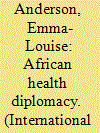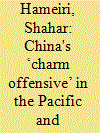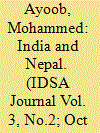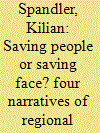|
|
|
Sort Order |
|
|
|
Items / Page
|
|
|
|
|
|
|
| Srl | Item |
| 1 |
ID:
159973


|
|
|
|
|
| Summary/Abstract |
Health crises pose fundamental challenges to international relations and have been a major focal point of contests for global influence, particularly in the global South, where such crises are most acute. This necessitates a focus on the arenas of global health diplomacy and the power struggles that emanate from them, including the often-overlooked agency of African actors within these arenas. Drawing upon a total of 3 months of fieldwork in 2007 and 2014 that included 68 key-informant interviews, participant observations, and informal discussions, this article interrogates the mechanics of multi-stakeholder health diplomacy in Malawi, where a near-permanent state of health crisis and underdevelopment has generated extreme dependency on external health assistance. This article conceptualises shadow diplomacy as the informal networks and channels of influence that run parallel to, but are not recognised as part of, formal diplomacy. This concept reveals how health is key to struggles for leverage by both international and local actors, giving rise to informal and subversive manifestations of diplomacy in the ‘shadows’. It enables us to understand not only how Western powers consolidate and obscure their enduring power but also how the ‘shadows’ benefit African political elites as they leverage their dependency to subvert global power structures for their own ends. It disrupts the external/internal binary of international donors/African states and reveals that these are not monolithic actors but instead comprising complex individuals with multi-faceted motivations and divided loyalties.
|
|
|
|
|
|
|
|
|
|
|
|
|
|
|
|
| 2 |
ID:
141144


|
|
|
|
|
| Summary/Abstract |
In recent years, a perception has emerged among many policymakers and commentators that the deepening of the People's Republic of China engagement in the Pacific Islands Region, predominantly through its expanding foreign aid programme, threatens to undermine the existing regional order, in which Australia is dominant. In this article, it is argued that China's apparent ‘charm offensive’ in the Pacific is mainly driven by commercial, not political, imperatives and is far more fragmented and incoherent than is often assumed. Hence, its (real) political effects hinge, not on any Chinese strategic designs for regional domination, or even a more limited resource security agenda, but on the intent and capacity of Pacific governments to harness deepening aid, investment and trade relations with China towards their own foreign and domestic policy objectives, which include limiting Australian interference in the internal governance processes of Pacific states. This argument is demonstrated by the case of Fiji after the December 2006 military coup.
|
|
|
|
|
|
|
|
|
|
|
|
|
|
|
|
| 3 |
ID:
178462


|
|
|
|
|
| Summary/Abstract |
Typhoon Yolanda brought major devastation to the local communities and infrastructure and also reshaped social structures and networks in the Philippines. During the immediate recovery process, bridging, bonding and linking social capital have had differential impacts and outcomes on how communities cope with the aftermath of the disaster. This article investigates the interplay between the various types of social capital and their contributions to immediate coping strategies of Typhoon Yolanda communities. This article also evaluates the complexity of defining social capital in a disaster context. In particular, it unpacks the blurring of the bridging and linking social capital at the immediate stage of rehabilitation in a post-disaster context and its impacts on the social fabric of the communities. We deduce from this case study the social capital strategies necessary for a speedy recovery process both economically and socially for disaster-affected communities.
|
|
|
|
|
|
|
|
|
|
|
|
|
|
|
|
| 4 |
ID:
176978


|
|
|
| 5 |
ID:
186107


|
|
|
|
|
| Summary/Abstract |
ASEAN member states have invested substantially in cooperation on humanitarian assistance and disaster relief (HADR). Despite broad support for the idea of ‘localizing’ HADR governance, the rise of regional agency has in practice led to uncertainty and frictions between humanitarian stakeholders. The article makes sense of these tensions by investigating the narratives through which intra- and extraregional agents construct the role of the ASEAN Coordinating Centre for Humanitarian Assistance on Disaster Management (AHA Centre). Based on the assumption that narratives are central legitimating practices when new agents enter a governance arena, it analyzes textual material produced by different humanitarian organizations that operate in Southeast Asia, as well as interviews with representatives from these organizations. Their accounts of the AHA Centre’s role can be grouped into four narratives that are bound up with competing ideas about regional humanitarian order: an affirmative one, a skeptical one, a critical one and a transformative one. The article thus rejects characterizations of regional HADR as a rationally designed ‘architecture’ and instead defines it as a deeply political arena where different conceptions of order are asserted, contested and negotiated.
|
|
|
|
|
|
|
|
|
|
|
|
|
|
|
|
|
|
|
|
|